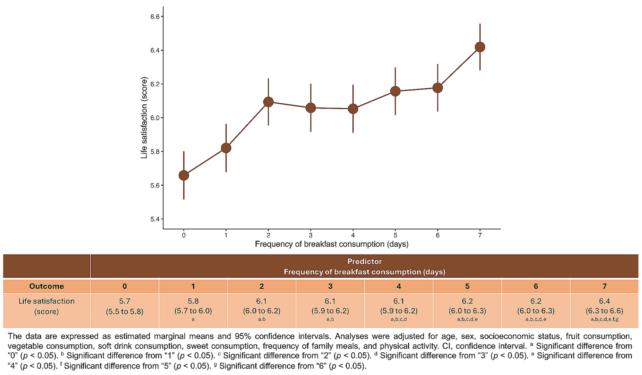Breakfast is celebrated by many as the most important meal of the day.
It may very well be to keep the children at school happy. According to a study of nearly 150,000 children and adolescents worldwide, breakfast eaters are more satisfied with their lives than those who skip meals.
The participants were between the ages of 10 and 17 and came from 42 different countries, including Russia, England, Scotland, Canada and many other countries in Europe and the Middle East.
The questionnaire asked people, “How often do you usually eat breakfast (more than a glass of milk or fruit juice)?” Answers were given regarding both school days and weekends.
The group was then asked to rate their perceived quality of life on a scale of 0-10, with 10 being the “highest imaginable quality of life” and 0 being the “worst imaginable quality of life.”
When the anonymized results were plotted on a graph with breakfast frequency on one axis and perceived quality of life on the other, an almost straight line formed between the data points.
The result was clear after an international team of researchers controlled for possible contributing factors such as gender, age, socioeconomic status, fruit and vegetable consumption, sweet intake, frequency of family meals, physical activity and body mass index.
At the top of the line were participants who said they ate breakfast every day, regardless of whether it was a school day or the weekend. This group had the highest life satisfaction scores, with an average of 6.3 to 6.6 points.
At the end of the line were those who never ate breakfast. They had the lowest average life satisfaction scores, averaging 5.5 to 5.8 points.

“The results showed some inconsistencies between countries, which may be influenced by different cultures and lifestyles and socio-economic factors,” notes senior author Lee Smith, an epidemiologist at Anglia Ruskin University in the United Kingdom.
“However, despite this, our results show that in all the countries studied, those who eat breakfast every day have generally higher life satisfaction than those who never eat breakfast.”
The findings agree with a study of more than 70,000 children in Australia, which found that skipping breakfast was associated with lower life satisfaction among boys and girls aged 8-18.
Whether this association is due specifically to skipping breakfast or skipping meals altogether was not determined. However, more detailed studies have shown that a nutritious breakfast is associated with many mental and physical health, including improved memory, cognitive function and physical activity.
It is important to note that the results are based on association studies, which means that breakfast consumption itself may not be the cause. It may even happen that the reason for skipping breakfast is also behind other negative consequences.
However, a study conducted in Korea found that as the frequency of a child’s breakfast increases, their “somatic” symptoms such as respiratory rate, fatigue, and sleep disturbances appear.spots, nausea, appetite, headache and fever are also reduced.
And these benefits may not only apply to young people.
in 2022 meta-analysis found that skipping breakfast was positively associated with an increased risk of depression, stress, and psychological distress everything age groups, but especially for under 18s.
“The scientific literature has consistently highlighted the link between skipping breakfast and negative mood in adolescents,” write lead author José Francisco López-Gil and colleagues.
“Despite this, relatively little research has been done on the relationship between breakfast frequency and perceived life satisfaction in adolescents.”
The result is that no one really knows why breakfast is so closely linked to adolescent moods.
“Adequate breakfast consumption provides the energy and nutrients needed for optimal cognitive functioning and increases concentration, memory and learning.” explains Smith.
“Another reason could be the mix of vitamins and minerals we get from our daily breakfast, and their irregular consumption can lead to a deterioration in life satisfaction over time. A regular breakfast routine can also bring structure and a positive tone to the rest of the day.”
This is one meal that youngsters won’t want to miss.
The study was published in BMC Journal of Nutrition.
#Children #eat #breakfast #day #share #common